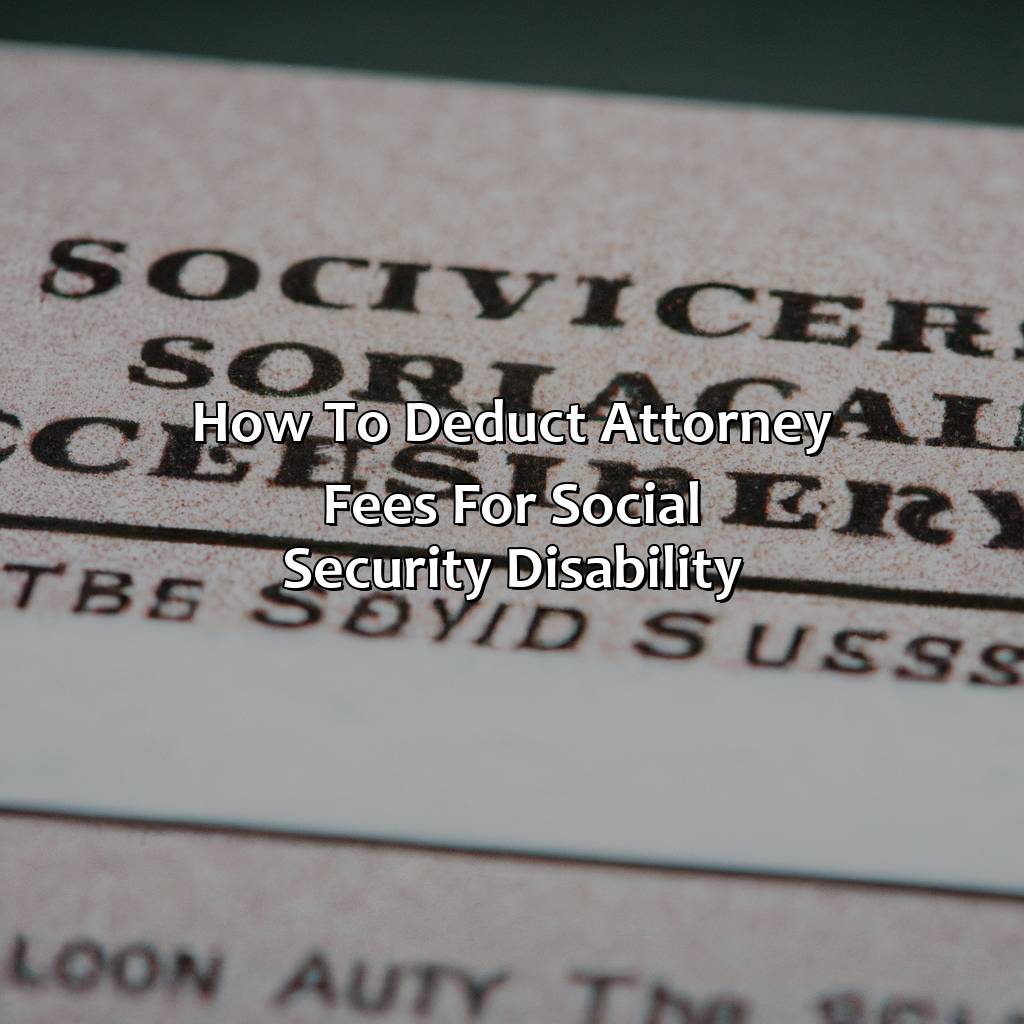Are attorney fees tax deductible for Social Security Disability? This is a question that often pops up for those navigating the complex world of disability benefits. The answer, as with many legal and financial matters, is a bit of a ‘it depends’. Navigating the Social Security Disability process can feel like a labyrinth, and having legal representation can be a lifeline.
But how do those fees factor into your tax obligations? Let’s dive in and explore the intricacies of this particular area.
Understanding the tax implications of attorney fees is crucial when dealing with Social Security Disability benefits. It’s not just about the legal fees themselves, but also about the impact on your overall tax situation. This guide will break down the key points to consider, offering clarity and insight into the tax landscape surrounding attorney fees in Social Security Disability cases.
Understanding Social Security Disability Benefits

Social Security Disability Insurance (SSDI) is a federal program that provides financial assistance to individuals who are unable to work due to a severe medical condition. SSDI benefits are intended to help individuals and their families cope with the financial challenges of a disability.
Eligibility Criteria for SSDI Benefits
To be eligible for SSDI benefits, individuals must meet specific criteria related to their disability and work history. The Social Security Administration (SSA) assesses these criteria to determine eligibility.
- Disability: The individual must have a medical condition that significantly limits their ability to perform substantial gainful activity (SGA). The SSA defines SGA as work that involves earning a certain amount of income each month. The SGA amount varies depending on the year. The disability must be expected to last for at least 12 months or result in death.
- Work History: The individual must have worked and paid Social Security taxes for a specific period, referred to as “work credits.” The number of work credits required varies depending on the individual’s age.
- Age: The individual must be younger than the full retirement age, which is currently 67. Individuals who become disabled before reaching the full retirement age may be eligible for SSDI benefits.
Types of Social Security Disability Benefits
The SSA offers different types of disability benefits based on the individual’s circumstances and the nature of their disability.
- Disability Insurance Benefits (DIB): These benefits are available to individuals who have worked and paid Social Security taxes, and who are disabled and unable to work.
- Supplemental Security Income (SSI): This program provides financial assistance to individuals with disabilities who have limited income and resources. SSI benefits are not based on work history.
- Child’s Disability Benefits: These benefits are available to children under the age of 18 who have a disability and whose parent(s) are receiving SSDI or retirement benefits.
- Survivors Disability Benefits: These benefits are available to the surviving spouse or children of a deceased worker who was receiving SSDI benefits.
Application Process for Social Security Disability Benefits
The application process for SSDI benefits can be complex and time-consuming. It is important to understand the steps involved and gather the necessary documentation.
- Step 1: File an Application: The first step is to file an application for SSDI benefits with the SSA. The application can be filed online, by phone, or in person at a local SSA office.
- Step 2: Initial Determination: The SSA will review the application and make an initial determination regarding eligibility. This typically takes several months.
- Step 3: Appeal Process: If the initial determination is unfavorable, the individual can appeal the decision. The appeal process can involve several levels, including a reconsideration, a hearing before an administrative law judge (ALJ), and a review by the Appeals Council.
- Step 4: Medical Documentation: The SSA requires comprehensive medical documentation to support the disability claim. This includes medical records, treatment summaries, and doctor’s statements.
- Step 5: Work History: The SSA will also review the individual’s work history to determine their eligibility for SSDI benefits.
Attorney Fees and Legal Representation: Are Attorney Fees Tax Deductible For Social Security Disability
Navigating the Social Security Disability (SSD) claims process can be complex and overwhelming. Attorneys play a crucial role in assisting individuals seeking SSD benefits, providing guidance and advocacy throughout the process.
An SSD attorney can help you understand your rights, gather necessary documentation, and prepare a strong application. They can also represent you at hearings and appeals, ensuring your case is presented effectively.
Types of Attorney Fees, Are attorney fees tax deductible for social security disability
Attorney fees for SSD claims are typically charged on a contingency fee basis. This means the attorney only receives payment if they successfully obtain benefits for you.
Here are the different types of fees that an SSD attorney may charge:
- Contingency Fee: This is the most common type of fee arrangement for SSD cases. The attorney receives a percentage of the back benefits you receive. This percentage is usually capped by law, and the specific amount can vary depending on the state and the attorney’s practice.
- Hourly Fee: Some attorneys may charge an hourly fee for their services. This means you pay them for the time they spend working on your case. This arrangement is less common in SSD cases, as it can be difficult to estimate the amount of time required.
- Retainer Fee: This is a fee paid upfront to secure the attorney’s services. Retainers are usually applied towards the overall fee charged for the case.
Contingency Fee Arrangements
Contingency fee arrangements are popular for SSD cases because they allow individuals to access legal representation without having to pay upfront fees. This can be especially helpful for individuals who are already facing financial hardship due to their disability.
Here are some key points to consider about contingency fee arrangements:
- Percentage of Back Benefits: The attorney’s fee is typically a percentage of the back benefits you receive. This percentage is usually capped by law, and the specific amount can vary depending on the state and the attorney’s practice.
- Fee Calculation: The attorney’s fee is calculated based on the amount of back benefits you receive, not the total amount of benefits you are entitled to. This means that if you are awarded benefits for a period of time, the attorney’s fee will only be based on the benefits you receive for that period.
- No Fee if No Benefits: Under a contingency fee arrangement, you will not have to pay any attorney fees if your claim is unsuccessful. This provides peace of mind knowing you are not risking any money upfront.
Tax Deductibility of Attorney Fees
The tax implications of attorney fees related to Social Security Disability benefits can be complex. Understanding the rules and regulations governing the deductibility of these fees is crucial for maximizing your benefits.
Deductibility of Attorney Fees
Attorney fees associated with obtaining Social Security Disability benefits are generally deductible as a miscellaneous itemized deduction on Schedule A of Form 1040. However, these deductions are subject to a 2% of adjusted gross income (AGI) limitation. This means you can only deduct the amount of your attorney fees that exceeds 2% of your AGI. For example, if your AGI is $50,000, you can only deduct the amount of your attorney fees that exceeds $1,000 (2% of $50,000).
The 2% of AGI limitation applies to several miscellaneous itemized deductions, including attorney fees, tax preparation fees, and certain other expenses.
Tax Laws and Regulations
The Internal Revenue Code (IRC) Section 212 governs the deductibility of attorney fees related to the production of income. The IRS has issued various publications and regulations clarifying the rules for deducting these fees.
Situations Where Attorney Fees May Be Deductible
Attorney fees incurred in the following situations may be deductible:
- Appealing a denial of Social Security Disability benefits.
- Representing you in a hearing before an Administrative Law Judge (ALJ).
- Representing you in a federal court appeal.
Situations Where Attorney Fees May Not Be Deductible
Attorney fees may not be deductible in the following situations:
- Fees incurred for obtaining Social Security retirement benefits.
- Fees incurred for obtaining Social Security survivor benefits.
- Fees incurred for obtaining Social Security Medicare benefits.
Documentation and Record-Keeping

Maintaining accurate records of attorney fees paid is crucial for claiming the tax deduction. The IRS requires specific documentation to support your claim, ensuring that you receive the full benefit of the deduction. Proper documentation helps you track your expenses, simplifies the tax filing process, and provides evidence for any potential audit.
Documentation of Attorney Fees
Documentation is essential for claiming the tax deduction for attorney fees. The IRS requires specific documentation to support your claim, including:
- Invoices: Request detailed invoices from your attorney that clearly state the date of service, the amount charged, and a description of the services provided.
- Payment Receipts: Keep copies of all payment receipts, including checks, credit card statements, or electronic payment confirmations.
- Engagement Letter: Obtain a copy of the engagement letter, which Artikels the scope of legal services, fees, and payment terms.
- Court Documents: Include copies of any relevant court documents, such as a case filing fee, which may be considered part of the attorney fees.
Organizing and Storing Financial Documents
Organizing and storing financial documents is crucial for easy access and retrieval during tax season.
- Digital Storage: Consider using cloud-based storage services to keep digital copies of your documents, ensuring easy access and backup.
- Physical Filing System: Create a designated file folder for your legal documents, organized by year or case.
- Tax Preparation Software: Use tax preparation software to track expenses and organize your documents.
Properly documented attorney fees provide evidence for tax deductions and simplify the tax filing process.
Seeking Professional Advice

Navigating the complexities of Social Security Disability benefits, attorney fees, and tax deductions can be overwhelming. Seeking professional guidance from qualified tax professionals or attorneys is crucial to ensure you understand your rights, maximize your benefits, and avoid potential legal pitfalls.
Professional advice can provide valuable insights into various aspects of your case, including:
Benefits of Professional Guidance
Consulting with a tax professional or attorney offers several advantages:
- Expertise and Knowledge: Tax professionals and attorneys possess specialized knowledge of tax laws, disability regulations, and legal procedures. They can guide you through the intricacies of the system and ensure you comply with all applicable rules and regulations.
- Representation and Advocacy: Legal representation is essential for navigating the complex legal process associated with disability claims and appeals. Attorneys can advocate for your rights, negotiate with the Social Security Administration (SSA), and represent you in hearings and appeals.
- Maximizing Benefits: A qualified professional can help you maximize your benefits by ensuring you receive all available entitlements and identifying potential deductions or credits. They can also assist with navigating the appeals process if your initial claim is denied.
- Avoiding Errors and Pitfalls: The Social Security Disability system is intricate and prone to errors. Professional guidance can help you avoid common pitfalls, such as missing deadlines, submitting incomplete documentation, or making incorrect statements.
Resources for Obtaining Tax Advice and Legal Representation
Several resources can help you find qualified tax professionals and attorneys:
- The American Bar Association (ABA): The ABA offers a lawyer referral service that can connect you with attorneys specializing in Social Security Disability law in your area. You can find this service on their website.
- National Organization of Social Security Claimants’ Representatives (NOSSCR): NOSSCR is a professional organization for Social Security Disability advocates. You can use their website to find certified representatives in your area.
- Local Bar Associations: Most local bar associations maintain referral services that can help you find attorneys in your area. You can contact your local bar association for more information.
- Tax Preparation Services: Many tax preparation services, such as H&R Block or TurboTax, offer assistance with tax deductions related to Social Security Disability benefits. You can consult with their professionals for guidance on claiming these deductions.
Navigating the world of Social Security Disability benefits, with its intricate rules and regulations, can be a daunting task. While legal representation can be invaluable, understanding the tax implications of attorney fees is essential. Remember, the tax landscape is constantly evolving, so seeking guidance from a qualified tax professional is always recommended. By staying informed and seeking expert advice, you can ensure that your financial well-being remains a priority throughout your Social Security Disability journey.
Questions and Answers
What if my attorney fee is paid through a contingency fee arrangement?
Contingency fee arrangements, where attorneys are paid a percentage of the benefits awarded, often involve unique tax considerations. It’s essential to discuss these arrangements with your attorney and a tax professional to understand the specific tax implications.
Can I deduct attorney fees even if I don’t itemize my deductions?
In most cases, you can only deduct attorney fees if you itemize your deductions on your tax return. However, there may be specific exceptions depending on the nature of your case and the applicable tax laws.
Where can I find more information on the tax deductibility of attorney fees?
The Internal Revenue Service (IRS) website and publications provide detailed information on tax deductions, including attorney fees. You can also consult with a qualified tax professional or attorney for personalized advice.






